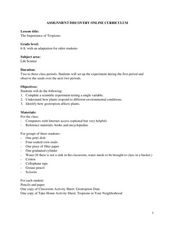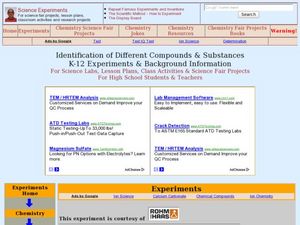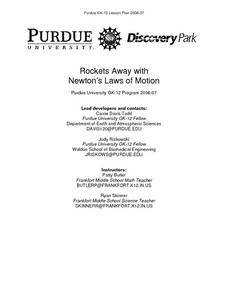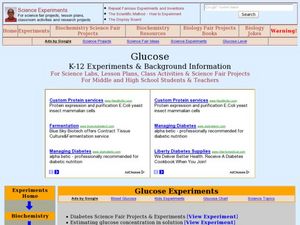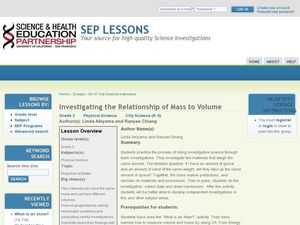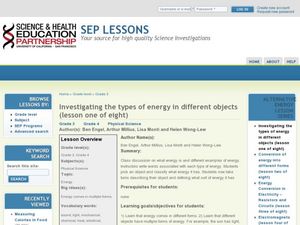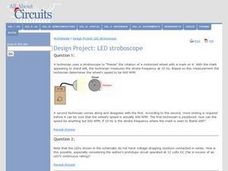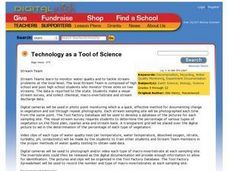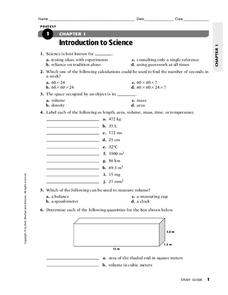Curated OER
The Difference Between Acids and Bases Using Different Indicators
Students identify the differences between acids and bases. In this acids and bases lesson plan, students identify and distinguish between acids and bases. They use household products to test the ph levels. They test the ph levels by...
Curated OER
The Importance of Tropisms
Students investigate plant tropisms using the scientific method. In this life science lesson, students learn about tropisms and test the response of corn seedlings to gravity. Response questions, extensions, and an adaptation for older...
Curated OER
Let it Roll!
Students explore how various ramps affect the rate of speed of a rolling object. In this physics lesson, students work in groups to build a ramp out of various materials. Students test and record the rate of speed of a rolling object by...
Curated OER
Bernoulli's Principle
Learners explore Bernoulli's principle, how it is related to flight, and the effect of lift, thrust, and drag on flight. They design and develop an experiment that tests for distance traveled by their paper airplane, and record and...
Curated OER
Waterdrops
In this science worksheet, students learn about water resources and watersheds by reading and answering questions in this 8 pages newsletter. Students learn about salt vs. fresh water, discover the protective role of estuaries, learn...
Curated OER
Identification of Different Compounds and Substances
High schoolers conduct a series of tests to identify unknown compounds. In this chemistry lesson, students compare the physical and chemical properties of substances. They collect data and formulate a conclusion.
Curated OER
Acids, Bases and Indicators
Students investigate the pH of various solutions with indicators. In this acids, bases and indicators lesson plan, students use a variety of indicators to test solutions for their pH. Students determine which indicators are the best to...
Curated OER
Barging Along
Students create a barge. In this technological design lesson, students use modeling clay to create a barge to hold marbles. Students make their barge then test it to see how many marbles it will hold. Students discuss why their design...
Curated OER
Rockets Away with Newton's Laws of Motion
Eighth graders comprehend Newton's Laws of Motion and to use the scientific method in rocketry sub-unit. They work through the scientific method. Students illustrate how science and Newton's Laws can be used in everyday situations and...
Curated OER
Glucose
Students conduct various experiments on glucose. In this biology lesson, students differentiate the process of diffusion and osmosis. They test different foods for the presence of glucose and starch.
Curated OER
Solar Cooking
Students experiment with a virtual solar cooker to discover the mathematical relationship among reflection, transmission and absorption. Then they actually build and test a solar cooker of their own invention.
Curated OER
Understanding Air Pressure
Fifth graders complete experiments with air to understand that air takes up space, has mass, and that air pressure can be changed. In this air pressure lesson, 5th graders test the air pressure by using balloons, syringes, and water to...
Curated OER
Investigating the Relationship of Mass to Volume
Third graders explore the relationship of mass to volume. In this physical science lesson, 3rd graders participate in an investigation with a several materials and measure the mass and volume using scientific tools. Students discuss and...
Curated OER
Creating the Ideal Cargo Boat
Students build boats out of clay to test the buoyancy of the boat in water. Students break into pairs and construct their boat to specific guide lines, then experiment with their boat in the water.
Curated OER
Frozen, Canned or Fresh?
Students compare spinach. In this Science lesson, students construct an experiment to test fresh, frozen, and canned spinach taste and texture. Students record their findings in charts and graphs.
Curated OER
Submersible Designer
Students work in groups to design, build, and test a submersible prototype. In this engineering lesson, students learn about the importance and design of submersible vessels and apply their knowledge by building one of their own. They...
Curated OER
Minerals Prime
In this minerals worksheet, students answer fifteen multiple choice questions about mineral formation, volcano and mountain formation, mineral tests and properties of minerals.
Curated OER
Wetland in a Pan
Seventh graders build a watershed from various materials. In this life science lesson plan, the students will be able to change the design of their watershed to see the changes in the way the water will drain. Each group will be able to...
Curated OER
Investigating the Types of Energy in Different Objects
Young scholars investigate forms of energy. In this physical science energy lesson, students work with a partner classifying household items according to the type of energy they have. Young scholars complete a related worksheet.
Curated OER
Design Project: LED Stroboscope
For this physics worksheet, students design and build an electrical circuit using LED as a light source. They complete 2 short answer questions about their design.
Rice University
What Should You Wear In Antarctica?
Students weigh various battings and feathers. They make sure to have the same weight of each type of insulations. Students wrap one bottle of warm water in each of the two insulations. They measure the temperature of each bottle,...
Curated OER
Science: Dissolved Oxygen and Water Quality Sampling
Students perform tests to determine the level of oxygen dissolved in water. After examining a table displaying the temperature and solubility of water, they examine the three stages involved in the test. Upon completion, students explain...
Curated OER
Technology as a Tool of Science
Students monitor streams, take stream surveys, collect chemical and macro-invertebrate and stream discharge data. Using a digital camera, students observe the percentage of various types of vegetation on the flood plan, riparian area and...
Curated OER
Introduction to Science
In this science measurement worksheet, students practice calculating volume, density, and area as it relates to science experiments. This worksheet has 4 multiple choice and 2 problems to solve.



